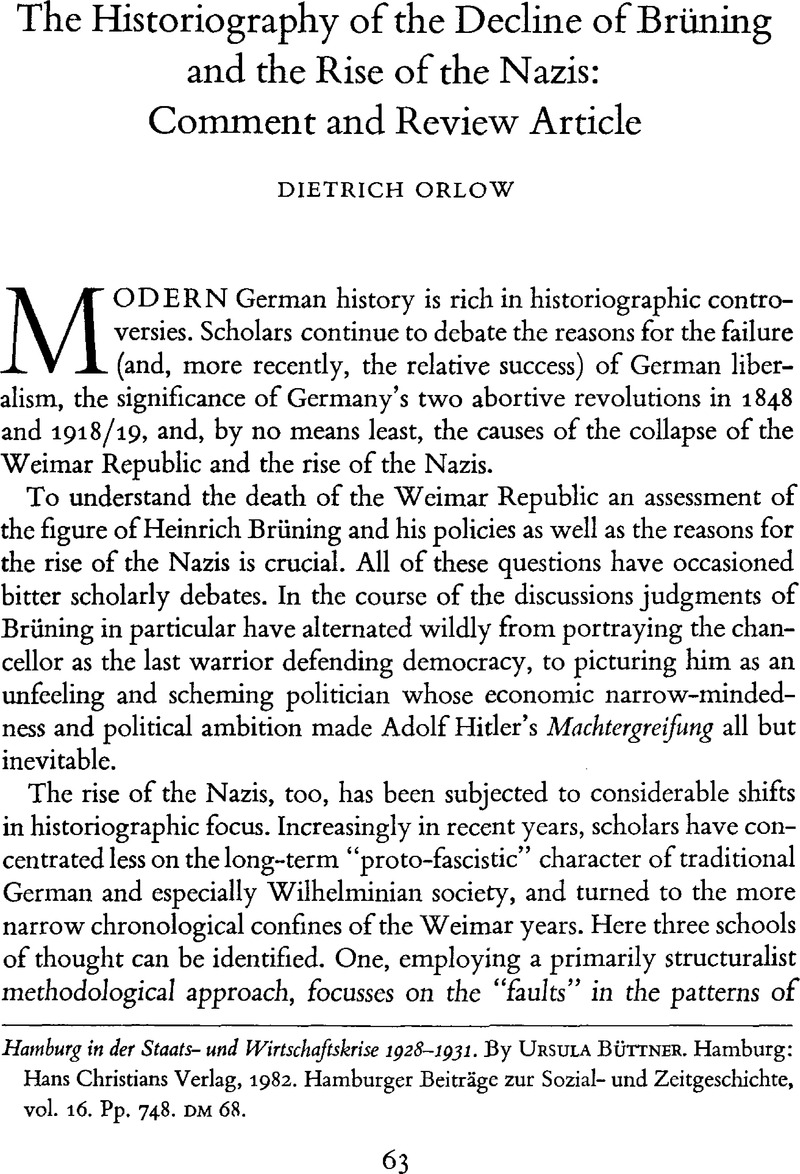No CrossRef data available.
Article contents
The Historiography of the Decline of Brüning and the Rise of the Nazis: Comment and Review Article
Published online by Cambridge University Press: 16 December 2008
Abstract

- Type
- Symposium: Who Voted for Hitler?
- Information
- Copyright
- Copyright © Conference Group for Central European History of the American Historical Association 1984
References
Hamburg in der Staats- und Wirtschaftskrise 1928–1931. By Büttner, Ursula. Hamburg: Hans Christians Verlag, 1982. Hamburger Beiträge zur Sozial- und Zeitgeschichte, vol. 16. Pp. 748. DM 68.Google Scholar
1. Two recent examples are David Abraham's by now highly controversial The Collapse of the Weimar Republic: Political Economy and Crisis (Princeton, 1981)Google Scholar; and Grübler, Michael, Die Spitzenverbände der Wirtschaft und das erste Kabinett Brüning (Düsseldorf, 1982).Google Scholar
2. For an excellent overview of recent literature on Hitler see Kater's, Michael recent article “Hitler in a Social Context” in this journal, 14, no. 3 (09 1981):243–72.Google Scholar
3. (Princeton, 1982).
4. Memoiren 1918–1934 (Stuttgart, 1970).Google Scholar
5. Most recently in the paper “Wirtschaftliche Ursachen des Scheiterns der Weimarer Republik,” Selbstpreisgabe einer Demokratie, ed. Erdmann, Karl Dietrich and Schulze, Hagen (Düsseldorf, 1980), 221–49.Google Scholar Borchardt's theses have been sharply criticized by Schulz, Gerhard, “Reparationen und Krisenprobleme nach dem Wahlsieg der NSDAP, 1930,” Vierteljahrschrift für Sozial- und Wirtschaftsgeschichte 67 (1980): 202 ff.Google Scholar; and Köhler, Henning, “Knut Borchardts ‘Revision des überlieferten Geschichtsbildes’ der Wirtschaftspolitik in der grossen Krise—eine Zwangsvorstellung?” Internationale Wissenschaftliche Korrespondenz 19, no. 2 (06 1983): 164–80.Google Scholar
6. The initials, which also identified the well-known news agency Wolffs Telegraphenbüro, derived from the initials of the major authors of the plan, Wladimir Woytinsky, Fritz Tarnow, and Fritz Baade.
7. In fact, detailed studies of local elections were until recently fairly rare. Hamilton has clearly become a model for this sort of research. See, for example, Krull, Lieselotte, Wahlen und Wahlverhalten in Goslar während der Weimarer Republik (Göttingen, 1982).Google Scholar




